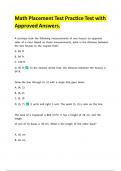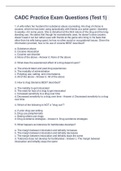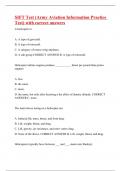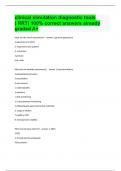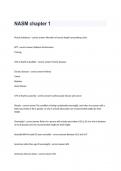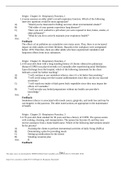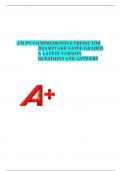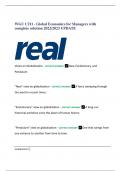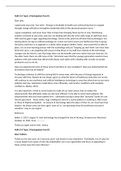Contemporary International System
MODULE 1: International Relations and The Study of the International System
- Two different definitions: international relations and International Relations (IR)
o International relations = diplomatic-strategic relations of states. The reality
o IR = study of the relations of states and that those relations are understood
primarily in diplomatic, military and strategic terms. cross border transactions
of all kinds and IR is likely to study trade negotiations or the operation of non-
state institutions. Characteristic focus of it is on war, peace, conflict and
cooperation.
o ‘International relations’ do not define the field of IR, rather scholars and
practitioners of the subject provide the definition.
o It is the state not the nation that deals with international relations. The
distinguishing feature of the state is sovereignty
- Characteristics of IR: as soon as the issue goes beyond national borders, it cannot be
dealt by only 1 superior form of authority. Conventional account of international
relations stresses the fact that the relationship between states is one of anarchy.
Anarchy in this context does not mean lawlessness and chaos; rather it means the
absence of a formal system of government. In international relations there is no
formal centre of authoritative decision-making institution that exists within the
state. This is why diplomacy and strategy are emphasized.
o War
o Peace
o Cooperation
o Negotiations
o UN
o Global finance
o Communication
o Transport systems
o Global business corporations
o NGO
o International relations are not political
- Self-help system: states have to protect themselves in terms of integrity of their
citizens, territory, economy etc. Can’t ask for a third party to oblige it to certain
duties. No other state can violate their integrity or threaten to violate the integrity
- Globalization
o Is it another name for global capitalism?
International relations and the study of war
- 19th century: ‘War appears to be as old as mankind, but peace is a modern invention’
- World war 1: moral crisis
, o Responses: anti-war sentiment, anti-imperialism (Lenin), liberal
internationalism (Woodrow Wilson) and League of Nations and the
Permanent Court of International Justice
o Potential cause rose disproportionally to potential benefits of war increase
in casualties, worth of acquiring land decreased
o WW1 was the most intense and most mechanical war in Europe
o Wilson’s 14 points (1918)
Anarchy, security and power
- The state: sovereignty, anarchy and power
- The state tis the key authority/player
o 1. Imperial system one government controls the states within its empire
eg Roman empire, British empire
o 2. Feudal system human loyalties and political obligations are not fixed to
territorial obligations but more based on local bishops etc
o Montevideo Convention ‘the state as a person of international law should
possess the following qualifications: a) a permanent population b) a defined
territory c) government and d) capacity to enter into relations with other
states
3 main elements: population, territory and government
1 legal element: sovereignty – key element
o What is power?
Complicated concept to define and measure
Elements of national power: population, money, army } intrinsic to
tangible things. Susceptible of measurement by certain well-defined
factors eg amount of resources – eg nuclear weapons
Relational power (type of causation) } Capacity to compel other states
and modify their behaviour. Influence in terms of economic, military,
symbolic and diplomatic means. Relationships between states. Actual
vs potential power
State power = resources and ability to mobilise them
Tangible resources
o Population, territory, wealth (GDP, HDI etc), military
power
Non-tangible resources
o Authority: leadership, political will, ideology
o Bureaucratic and political organisation, diplomacy,
intelligence, propaganda
o Social/national cohesion
o Reputation, legitimacy, foreign support
Issues:
, o Fungibility problem – fungible = a resource has the
same value no matter the location (the most common
example is money)
o Problem of intentions
o Measurement problem – power has multiple
dimensions
o Relational vs structural power
Structural power = power to shape and determine the structure of the
global political economy within which other states, their political
institutions, their economic enterprises and their scientists and other
professional people have to operate. (Susan Strange)
4 structures: control over security, production, credit and knowledge
- Soft and hard power
o Soft power = influencing actions of other states via diplomatic means
o Hard power = influencing actions of others by other incentives eg money
o Smart power = combines both
- International order
o International system
When 2 or more states have sufficient contact between them and
have sufficient impact on another’s decision
Causes them to behave as part of a whole
Direct vs indirect interaction
Interactions may take the form of cooperation, but also conflict or
even neutrality of indifference
o International society
A group of states, conscious of certain common interests and values
They conceive themselves to be bound by a common set of rules in
their relations with one another and share in the working of common
institutions.
An international society presupposes and international system
o International community
Order among humankind as a whole
Order among states on a domestic and municipal scale
The ultimate unit are individual human beings
Why even in the absence of a central authority, the international system is not a real
anarchy?
- Hedley Bull: In the absence of state, individuals would be living in a ‘state of nature’
which means there will be continuous competition between citizens eg bc there
, won’t be any property protection, security etc. A superior institution is needed to
stop us from killing each other
- But how do we not have constant war in the international system?
- Order in social life: a pattern or regularity in the relations of human individuals that
sustain elementary, primary and/or universal goals.
- 3 main principles for social life:
o 1. Security against violence
o 2. Keeping of promises
o 3. Possession of property remains stable
- International order pattern or disposition of international activity that sustains
the goals of society of states that are elementary, primary or universal
o The preservation of the. System and society of states
o The maintaining the independence of individual states
o Peace – absence of war
o The common goals of social life
Monopoly of violence – limitations on the right to use violence
Pacta sunt servanda – acting in good faith
Mutual recognition of sovereignty – idea that certain territories and
peoples were the property of patrimony of the rule
- How is int order maintained?
o Contingent facts
o Common interests
Balance of power – try to have the same power as the most powerful
states so as to not be threatened by them
Common interest – in the 3 main principles
States are ready accept some restrictions which would help achieve
these common interests
o Rules – what behaviour is consistent with the common interests and goals?
Provide precise guidance as to the proper application of the 3 main
rules. Guide behaviours for them to be compliant with the main
principles
Operational rules = rules of the game
Rules become established practice
o Institutions (≠ organisations)
In IR there is a clear distinction between institutions and organisations
International insts are complexes of norms, rules and practices
that prescribe behavioural roles, constrain activity and shape
expectations – not all institutions have organisational
structures and not all organisations have institutional
structures
3 main types:
Deeps constitutional institutions – sovereignty related institutions
MODULE 1: International Relations and The Study of the International System
- Two different definitions: international relations and International Relations (IR)
o International relations = diplomatic-strategic relations of states. The reality
o IR = study of the relations of states and that those relations are understood
primarily in diplomatic, military and strategic terms. cross border transactions
of all kinds and IR is likely to study trade negotiations or the operation of non-
state institutions. Characteristic focus of it is on war, peace, conflict and
cooperation.
o ‘International relations’ do not define the field of IR, rather scholars and
practitioners of the subject provide the definition.
o It is the state not the nation that deals with international relations. The
distinguishing feature of the state is sovereignty
- Characteristics of IR: as soon as the issue goes beyond national borders, it cannot be
dealt by only 1 superior form of authority. Conventional account of international
relations stresses the fact that the relationship between states is one of anarchy.
Anarchy in this context does not mean lawlessness and chaos; rather it means the
absence of a formal system of government. In international relations there is no
formal centre of authoritative decision-making institution that exists within the
state. This is why diplomacy and strategy are emphasized.
o War
o Peace
o Cooperation
o Negotiations
o UN
o Global finance
o Communication
o Transport systems
o Global business corporations
o NGO
o International relations are not political
- Self-help system: states have to protect themselves in terms of integrity of their
citizens, territory, economy etc. Can’t ask for a third party to oblige it to certain
duties. No other state can violate their integrity or threaten to violate the integrity
- Globalization
o Is it another name for global capitalism?
International relations and the study of war
- 19th century: ‘War appears to be as old as mankind, but peace is a modern invention’
- World war 1: moral crisis
, o Responses: anti-war sentiment, anti-imperialism (Lenin), liberal
internationalism (Woodrow Wilson) and League of Nations and the
Permanent Court of International Justice
o Potential cause rose disproportionally to potential benefits of war increase
in casualties, worth of acquiring land decreased
o WW1 was the most intense and most mechanical war in Europe
o Wilson’s 14 points (1918)
Anarchy, security and power
- The state: sovereignty, anarchy and power
- The state tis the key authority/player
o 1. Imperial system one government controls the states within its empire
eg Roman empire, British empire
o 2. Feudal system human loyalties and political obligations are not fixed to
territorial obligations but more based on local bishops etc
o Montevideo Convention ‘the state as a person of international law should
possess the following qualifications: a) a permanent population b) a defined
territory c) government and d) capacity to enter into relations with other
states
3 main elements: population, territory and government
1 legal element: sovereignty – key element
o What is power?
Complicated concept to define and measure
Elements of national power: population, money, army } intrinsic to
tangible things. Susceptible of measurement by certain well-defined
factors eg amount of resources – eg nuclear weapons
Relational power (type of causation) } Capacity to compel other states
and modify their behaviour. Influence in terms of economic, military,
symbolic and diplomatic means. Relationships between states. Actual
vs potential power
State power = resources and ability to mobilise them
Tangible resources
o Population, territory, wealth (GDP, HDI etc), military
power
Non-tangible resources
o Authority: leadership, political will, ideology
o Bureaucratic and political organisation, diplomacy,
intelligence, propaganda
o Social/national cohesion
o Reputation, legitimacy, foreign support
Issues:
, o Fungibility problem – fungible = a resource has the
same value no matter the location (the most common
example is money)
o Problem of intentions
o Measurement problem – power has multiple
dimensions
o Relational vs structural power
Structural power = power to shape and determine the structure of the
global political economy within which other states, their political
institutions, their economic enterprises and their scientists and other
professional people have to operate. (Susan Strange)
4 structures: control over security, production, credit and knowledge
- Soft and hard power
o Soft power = influencing actions of other states via diplomatic means
o Hard power = influencing actions of others by other incentives eg money
o Smart power = combines both
- International order
o International system
When 2 or more states have sufficient contact between them and
have sufficient impact on another’s decision
Causes them to behave as part of a whole
Direct vs indirect interaction
Interactions may take the form of cooperation, but also conflict or
even neutrality of indifference
o International society
A group of states, conscious of certain common interests and values
They conceive themselves to be bound by a common set of rules in
their relations with one another and share in the working of common
institutions.
An international society presupposes and international system
o International community
Order among humankind as a whole
Order among states on a domestic and municipal scale
The ultimate unit are individual human beings
Why even in the absence of a central authority, the international system is not a real
anarchy?
- Hedley Bull: In the absence of state, individuals would be living in a ‘state of nature’
which means there will be continuous competition between citizens eg bc there
, won’t be any property protection, security etc. A superior institution is needed to
stop us from killing each other
- But how do we not have constant war in the international system?
- Order in social life: a pattern or regularity in the relations of human individuals that
sustain elementary, primary and/or universal goals.
- 3 main principles for social life:
o 1. Security against violence
o 2. Keeping of promises
o 3. Possession of property remains stable
- International order pattern or disposition of international activity that sustains
the goals of society of states that are elementary, primary or universal
o The preservation of the. System and society of states
o The maintaining the independence of individual states
o Peace – absence of war
o The common goals of social life
Monopoly of violence – limitations on the right to use violence
Pacta sunt servanda – acting in good faith
Mutual recognition of sovereignty – idea that certain territories and
peoples were the property of patrimony of the rule
- How is int order maintained?
o Contingent facts
o Common interests
Balance of power – try to have the same power as the most powerful
states so as to not be threatened by them
Common interest – in the 3 main principles
States are ready accept some restrictions which would help achieve
these common interests
o Rules – what behaviour is consistent with the common interests and goals?
Provide precise guidance as to the proper application of the 3 main
rules. Guide behaviours for them to be compliant with the main
principles
Operational rules = rules of the game
Rules become established practice
o Institutions (≠ organisations)
In IR there is a clear distinction between institutions and organisations
International insts are complexes of norms, rules and practices
that prescribe behavioural roles, constrain activity and shape
expectations – not all institutions have organisational
structures and not all organisations have institutional
structures
3 main types:
Deeps constitutional institutions – sovereignty related institutions


